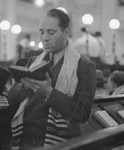Shule for the irreligious? – Ask the Rabbi
Q. I’m not religious, so why should I go to shule?
 A. It all depends on what “not religious” means.
A. It all depends on what “not religious” means.
Perhaps you do not observe Shabbat or kashrut strictly, but though that’s an immense pity it doesn’t prevent you being religious or having spiritual feelings.
Perhaps it has something to do with your particular synagogue; I’ve heard it said about certain congregations, “That’s not a religious shule”.
Presumably it means that the synagogue is not strictly Orthodox, but it’s strange to call a shule irreligious: for how can a house of worship be anything other than religious?
The fact is that we all have our moments of sheer, breathtaking spirituality.
We all know people of sheer piety and goodness and places of sheer awe and reverence. The whole of nature breathes religiosity. We look above us and have no choice but to say with the Psalmist, “The heavens declare the glory of God.”
We see the trees shaking in the wind, and they seem like worshippers swaying. The birds too seem to be spiritual when, as the prayer book puts it, b’tziftzuf m’tzaftz’fim – “they chirp a song unto God”.
Rav Kook was spiritually moved when he gazed at the art works in the National Portrait Gallery in London.
He said, “When God created light, it was so strong that one could see from one end of the world to the other. But lest the wicked abuse it, what did God do? He preserved the light for the righteous in the time of the Messiah, but now and then there are great men who are privileged to see it. I think Rembrandt was one of them. The light in his pictures is the very light that was originally created.”
Rav Kook also said that music, geometry and even law were a source of poetry and even spirituality. Albert Einstein said it was a religious experience “when a man has a true idea (and) something within him drives him on”.
But it is not only great and famous people who do great deeds and create great works that inspire the hearts, minds and souls of others. The so-called little people also do great deeds when they raise themselves from dust to destiny. They all attest to the spiritual force and energy in the universe. In their own way they are all religious.
Yes, some come to the synagogue and are put off by the apparent lack of spirituality in the people around them, the incessant chatter that some cannot control, the banality of thought that is all they can muster on a holy day in a place of worship. Yet even in shule, especially in shule, we can all make spiritual discoveries.
If we look into the face of our child, our parents or grandparents, we know there is a God. If we leaf through the prayer book, we are reminded of and moved by the principles of beauty, truth, justice, compassion and peace around which the liturgy is built.
Sorry my friend, I simply don’t know what you mean when you tell me you are not religious. I think you are religious after all.
I apologise if this gives you a shock, because you are going to have to face some teasing down at the golf course this week when you tell your colleagues you have caught religion.
But on the other hand, when your colleagues themselves think about it for a moment, they will discover that they are religious too. So you’ll smile, and they will smile, and when you and they come to shule next you’ll find there is a smile on the face of the shule too.



